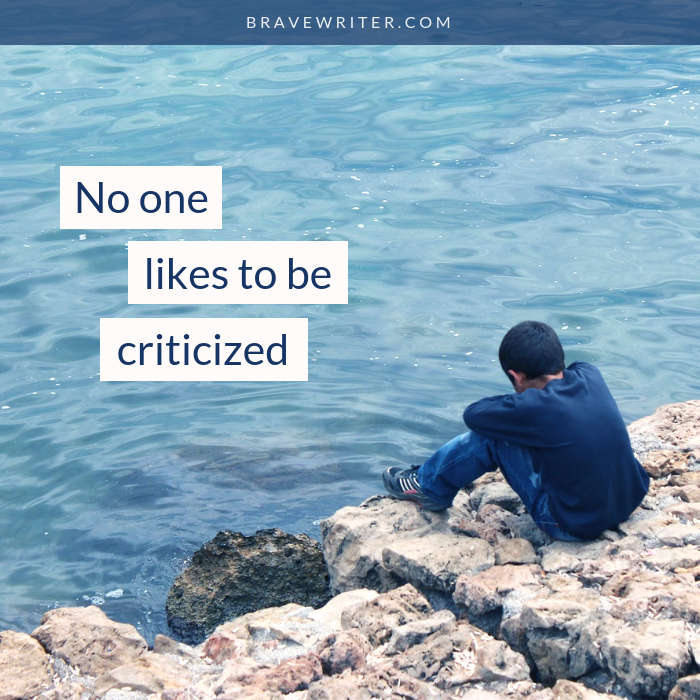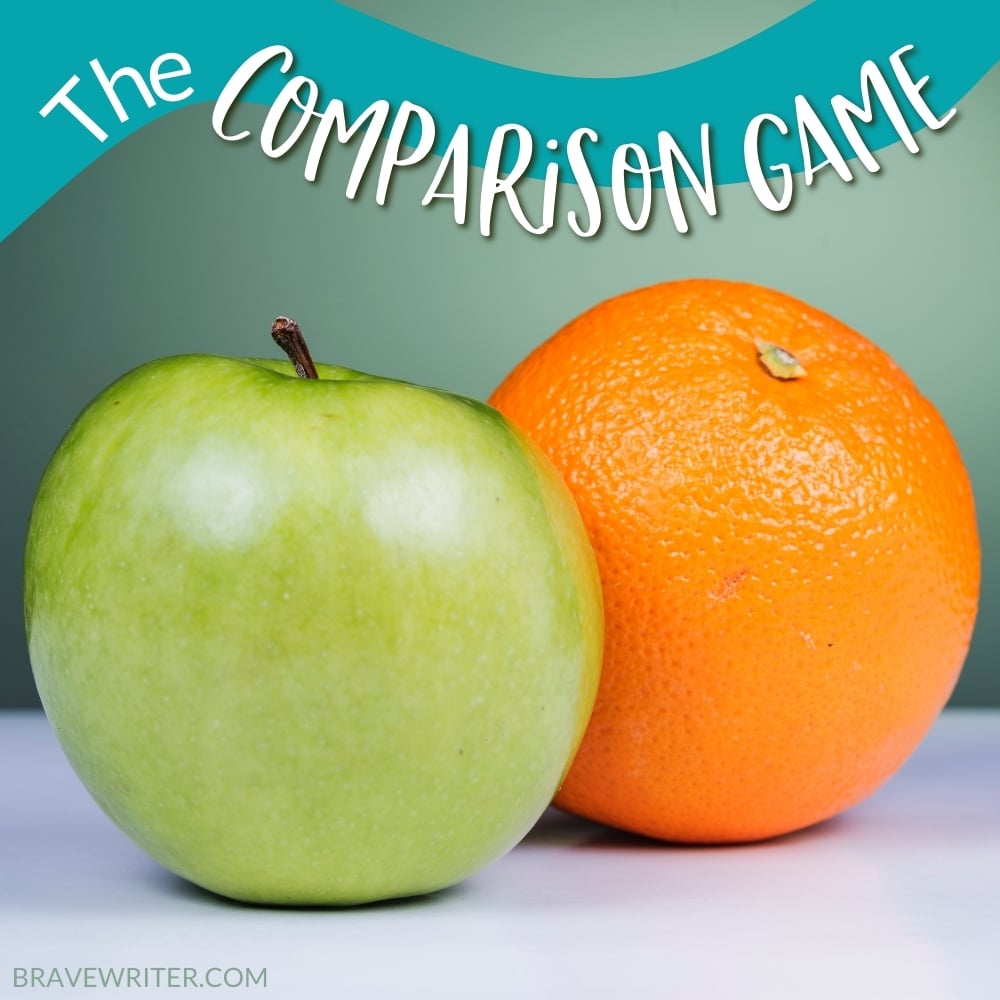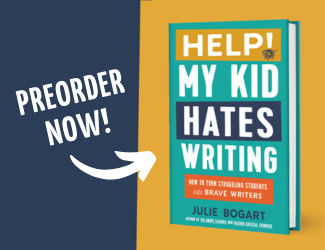
No one likes to be criticized. No one.
You don’t. You don’t want someone to come along and examine what you do in your homeschool and tell you that you’ve got it wrong.
I don’t. I don’t like being examined and found wanting.
Writers don’t. They risk putting themselves out there, even if what they risk appears paltry and disconnected from what they care about, and still recoil from editorial feedback.
Yet we all want to grow and become better versions of ourselves. Don’t we? In our most honest moments?
It takes some toughness to be open to criticism. There’s a reason for this. Criticism exposes mistakes. The experience of being mistaken is painful. You feel exposed—there it is, your failure, out there for all to see.
No one likes that feeling. Worse, if you are seeking support and feedback, getting criticism in return can feel like a betrayal of trust. You shared your struggle using the words available to you, and this other person picked them apart or misheard your intention or cared only about her superior understanding and appeared to take pleasure in her reconstruction of the “right way.”
There is a way to deliver feedback that doesn’t leave the recipient undone, devastated, hurt, or embarrassed. It’s the chief feature of our writing instruction, and is at the heart of how I operate in my family and business.
I follow these principles because they ensure emotional safety, while allowing for dialog for growth.
1. Value the person.
Your child, your spouse, your best friend, the member of your email list or discussion board needs to know that you value him or her first. The human being taking the risk to share “self” with you must feel that she is valuable, essentially worthy of care and consideration. That comes from the time-consuming task of using words, facial expressions, and internal postures that remind you that, in fact, this person is worthy of my time/energy/care. Most people want to be good people, or regarded as such, which is a good enough basis from which to begin.
Your kids want to be good kids, want to please you, want to do what they are supposed to do to become full-fledged adults. They want your guidance, too. Most spouses want to be loved and to give love back. Most best friends want to be trusted allies. Most participants on most lists and boards want to be heard and helped.
Yes, there are exceptions, but let’s start with the rule: Most human beings seek connection, and want a mirror that tells them: “I see you. You matter.”
2. Failure is painful.
The failure to live up to one’s own vision of success (successful living—homeschooling, marriage, career, writing a paragraph, being a teammate, running a household, parenting, managing finances, exercise and diet, calculating percentages in an online game) is painful. All by itself. This must be appreciated before offering a critique. Even the cavalier, halfhearted effort is often a cover for not wanting to risk full commitment to avoid giving a best effort and failing still. Better to only “half-try” and then when criticized you can tell yourself, “I wasn’t really trying.” This half-effort protects the ego because what if you gave a full effort and still failed? That would mean you were fundamentally flawed, unable to grow/succeed. “What more can be given than a ‘full effort’?” goes the unconscious reasoning.
So before feedback, it’s important to have full appreciation for the pain of failure. Your comments are about to land someone in that pain (particularly if delivered with judgment, anger, or exasperation).
3. Frame your feedback.
Give information, not criticism.
“Looks to me like you wanted the reader to pause here. We use a comma for that.”
Is much better than:
“You left out a comma.”
Or as one of our instructors says, she likes to use “Remember to…” rather than “Don’t forget to…” Even a simple switch to a positive is better received than a negative.
The premise is that everyone is trying his or her best. Even when they aren’t, they can be inspired to try their best when we find the glimpses of effort behind the half-try.
“I’m so glad you answered the question. I look forward to reading more answers from you this week.”
Much better than:
“You aren’t giving me enough material to read so I can comment. I expect more later this week.”
I’ve noticed that homeschool discussion board conversations devolve when the original poster asks a question, not using the evolved vocabulary of the group, and is then challenged for her errant thinking. This experience leads to online flailing: the need to reframe, restate, explain away. The original poster will then try to give some sense of her inner process to justify her poorly worded question, which is batted away by the experts as her not taking criticism/feedback well.
Some people are strong enough for that kind of aggressive help. But many are not. Most children are not.
It helps to receive the intention of the person first, to value the desire to connect, or to ask for help, or to share first efforts in work. It helps to remember that failing is painful, and that having a failure pointed out is exposing and embarrassing. What works at that point is supportive, positive feedback that takes into account the whole person, not just their weakness or failure to perform at the desired level.
You get there through a self-discipline of thinking in a new way. Take time to find it. Your child isn’t lazy. Your child didn’t do the work. Ask yourself why? Think about how you might support a change in atmosphere around the topic, or help your child to see the benefits of effort, even small, short bursts of concentration. Start there rather than a berating of character.
Your child isn’t addicted to video games. He loves playing them. He gets things from them that make him happy. What is he getting? What can you learn about video games to understand why he is so absorbed? What else can you offer him in his life that is also compelling, and could be of interest to him?
Or conversely, is it possible that something “not good” is happening in his world and video games are giving him a way of escape? Can you find out?
Conversations that are non-judgmental, curiosity-seeking, supportive explorations will lead to receptivity more than labels and reactionary anger.
Sometimes we all lose our cool and say mean things or jump to conclusions. Sometimes we’re right—the other person is being mean-spirited or recalcitrant and is not receptive to input from us. Sometimes we are in abusive relationships! No amount of supportive dialog will yield good results.
But on the whole, a practice of this kind will bring about trust, support, and growth. That’s how we grow brave writers, in fact. And it works beautifully.
























